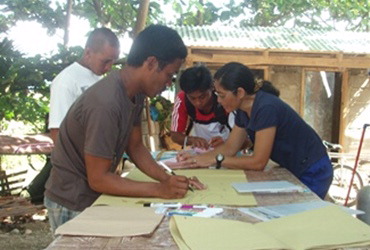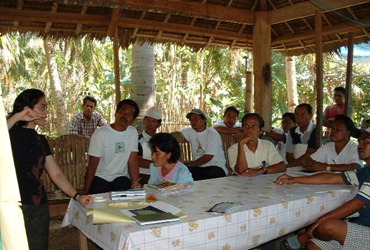As a result of this research and analysis, the team focused on developing ways to apply the findings across a wide range of educational sectors and worked closely in targeted best practices areas to transfer what they learned. They partnered with University of the Philippines School of Health Sciences and the Aurora Province Health Department to obtain data for a project on Maternal and Early Childhood Protein Nutrition, which were then analyzed by team members.
High school students were mentored and exposed to outdoor biodiversity experiences, participated in several leadership development workshops, visited a Marine Protected Area (MPA) for snorkeling, and helped plan and deliver a community-based Earth Day celebration. Now organized as the Baler Youth Environment Ambassadors, they continue to spearhead ecological solid waste management programs in their campuses and have helped communities start their own compost pit. Undergraduate students in nursing and fisheries programs were provided with hands-on experience in conducting research, with the field research becoming part of their course work. They also gained knowledge on the concept of the cultural consensus model (CCM) and skills in data collection through interviews, the 5-point Likert Scale, and simple qualitative analysis. Fishers, primarily members of the PAMANA KA SA Pilipinas national alliance also gained knowledge on the CCM concept and its implications for different stakeholders. Selected leaders were tapped as enumerators in several PAMANA sites after undergoing orientations and practice in data collection.
Members of Kalipunan ng Mangingisda sa Dagat ng Baler (KALMADABA), an alliance of Fishers, including female members, from different villages in the municipality of Baler participated in resource assessment of the intertidal reef flat, notably the mangrove and seagrass ecosystems, and gained skills in conducting interviews. Simple analysis of the data and presentation skills were also provided which allowed them to give feedback on the results credibly to important government officials, The aim of this mentoring program was for KALMADABA to take the lead in proposing a protected area for the deteriorating conditions of their intertidal reef flat, and the team provided them with seed funds and financial management training to continue the project.
The team sought to partner with four provinces to formalize the Aurora Marine Protected Area network and consider adding new offshore MPAs. All told, the PEER team organized or were involved in more than 25 workshops, trainings and conferences.
Publications and Other MaterialsM.E. Raquino, M. Pajaro, and P. Watts. 2015. Integrating marine biodiversity through Philippine local development plans.
Management of Environmental Quality: An International Journal 26(2): 159-171.
http://dx.doi.org/10.1108/MEQ-09-2013-0097 P.D. Watts and M.G. Pajaro. 2014. Collaborative Philippine-Canadian action cycles for strategic international coastal Ecohealth.
Canadian Journal of Action Research 15(1): 3-21.





